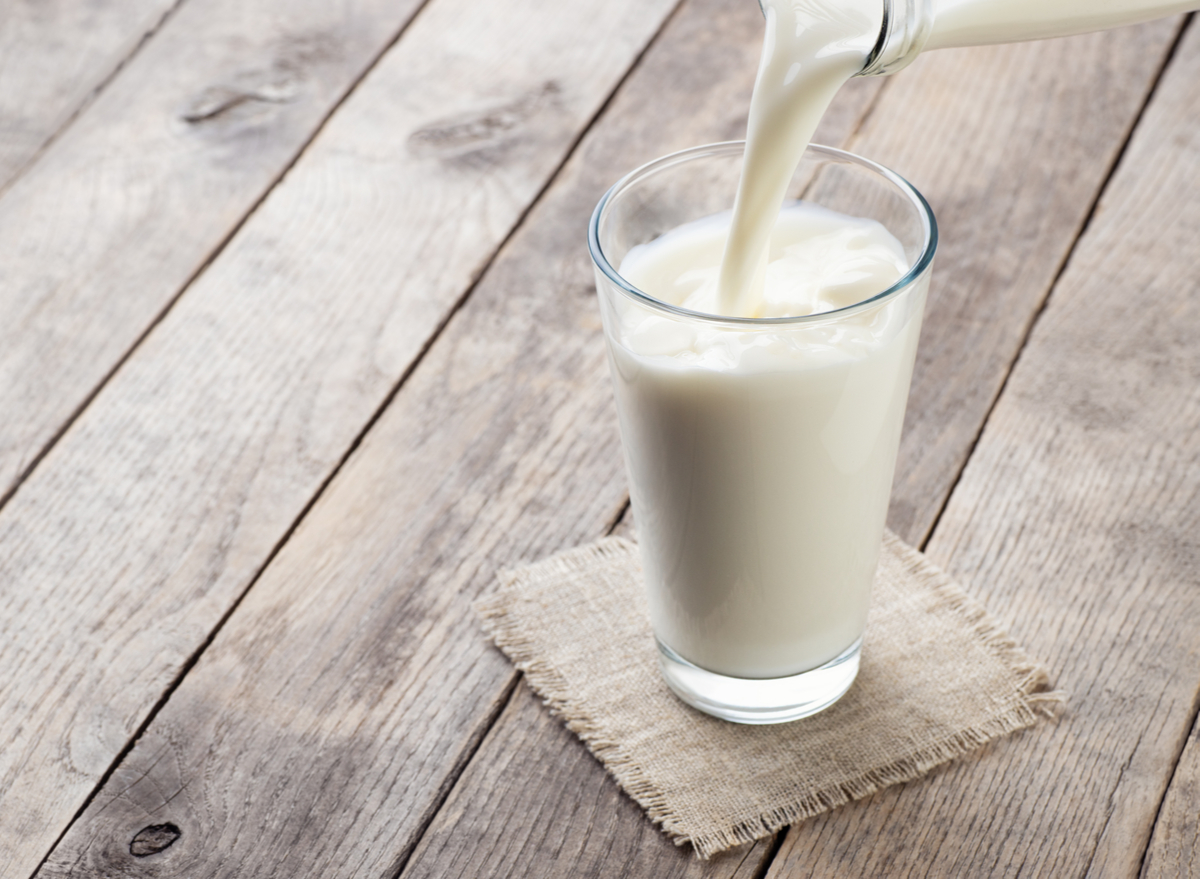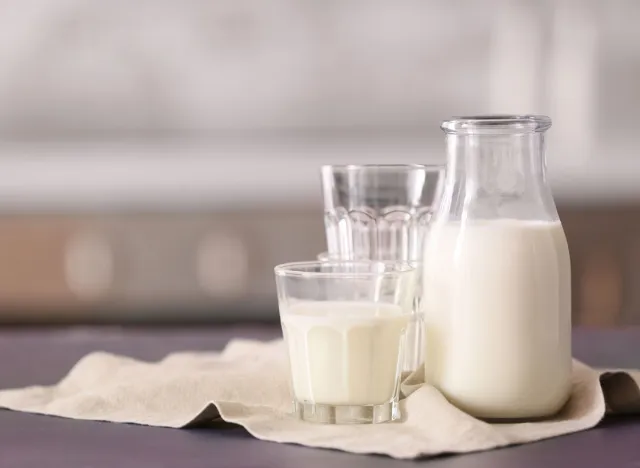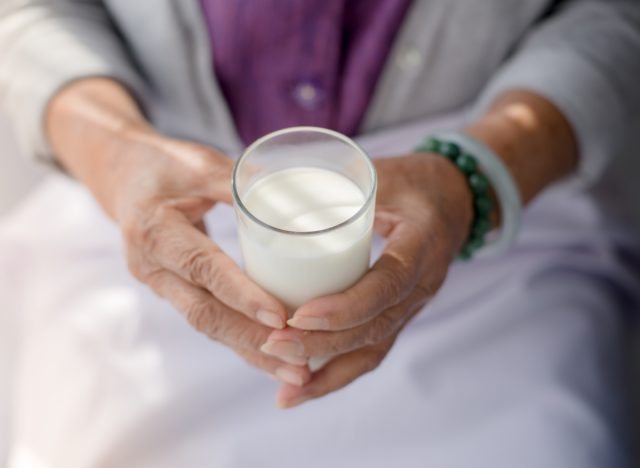Is Milk Good For You? 6 Effects of Drinking It

Nowadays, all you have to do is walk into your local cafe, and you may be faced with a lengthy list of non-dairy milk alternatives like almond, oat, macadamia, coconut, or soy. In fact, it almost seems taboo to still order your coffee with cow’s milk, which may bring you judgmental stares as you ask your barista. And even though this drink has been proven to have many health benefits, many people are still worried about consuming this beverage and are asking, “Is milk good for you,” or should it be left on the shelf?
Dairy milk has been a hot topic of debate for quite some time, and it seems like there’s been a shift in how people view this product. At first, no one could get enough of this drink when campaigns like the “Got Milk” ads began in 1993, featuring celebrities like Venus and Serena Williams, the cast of Friends, Beyoncé, Harrison Ford, and Steven Tyler. The campaigns worked for decades, and families knew cow’s milk as a way to get strong bones. However, plant-based milk alternatives were integrated as a solution for people who didn’t want to consume animal fat, or who were experiencing symptoms of lactose intolerance. And in 2020 the USDA released a report saying that sales of these alternative beverages were replacing that of dairy milk.
Because of these differing outlooks on cow’s milk, many people are left wondering if milk is healthy, or if they should make the switch to non-dairy. To learn more about the effects of drinking milk, we talked with Lauren Manaker, MS, RDN, registered dietitian and author of The First Time Mom’s Pregnancy Cookbook and Fueling Male Fertility. Read on to learn four possible benefits and two potential side effects, and for more health tips, check out Is Peanut Butter Good For You? 20 Effects of Eating It.
Is Milk Good For You? 4 Benefits of Drinking It
1. Milk may help give you stronger bones

It’s a tale as old as time: drink more milk to get stronger bones. But is there any truth to the story, or is it nothing more than a marketing scheme? According to Manaker, milk really does contain “bone health-supporting nutrients like calcium, magnesium, and zinc.” She adds, because of this, “drinking milk can fuel bones to be as strong as possible.”
According to a recent report published in Nutrients, researchers suggest that people should not be avoiding milk later in life, as this drink can help them maintain bone mass and prevent osteoporosis—which is a common issue people may experience as they age.
Another report from 2022 states that the combination of calcium and protein in milk is crucial for healthy bones, and that children and older adults, especially if on a plant-based diet, are more at risk for bone fracture. The researchers state that because of this, these populations shouldn’t avoid milk or dairy.
2. You’ll get a boost of protein
Dairy products can be excellent sources of high-quality protein, but many people stay away from these foods and drinks because of the higher fat content. However, if you avoid drinking milk, you’re missing out on an easy way to get a protein boost.
For example, a standard cup of whole milk will give you about 8 grams of quality protein. In contrast, if you were to opt for a non-dairy option like almond milk, you may only get about 1 gram on average.
3. You may have supported immune health

According to Manaker, “Milk can also help boost your immune system because of nutrients like zinc and vitamin A.”
The CDC emphasizes that vitamin A is important for both immune health and your eyesight, which is why it’s especially important for kids to start getting enough of this micronutrient at a young age. Research also suggests that zinc is helpful in immunity, and some reports specifically say it may be one of the foundational nutrients needed for immune health.
With this in mind, it’s no surprise that a study published in Frontiers in Nutrition found that milk (which contains both vitamin A and zinc) may be able to specifically help immune function in the intestine and upper respiratory tract.
4. You’ll get some extra B vitamins
Drinking just one glass of dairy milk can give your body a helpful boost of multiple types of B vitamins. B12 is the most prominent in milk, which can help benefit your nerve cells and blood vessels. At first glance of the nutrition label, you may not see other B vitamins list, but many of the B vitamins have other names.
For instance, riboflavin is B2, niacin is B3, biotin is B7, and folate is B9. Even though milk just has small amounts of these B vitamins, it will still add to your daily values.
Two Potential Side Effects of Drinking Milk
1. You’ll consume more saturated fat

Even though there are a handful of benefits that come from drinking milk, there are a couple of things you may want to consider—the first being that you may consume more saturated fat than if you were to drink a dairy alternative.
A cup of whole milk has about 4.5 grams of saturated fat, and 1% milk only has about 1.5 grams. Having a little bit of saturated fat isn’t harmful, but diets higher in this type of fat can contribute to higher cholesterol and an increased risk of heart disease. This is certainly not to say that you should give up milk completely, especially because of its many benefits. But since the American Heart Association suggests limiting yourself to only 13 grams of saturated fat per day (or 5-6% of your daily calories) for a healthy heart, it’s important to monitor how much you’re drinking.
2. You may be lactose intolerant
When the question “is milk good for you?” arises, the answer will be different for people who are lactose intolerant. It’s something none of us want to think about and many of us fear, because it could mean giving up our cheese board and wine habit. But, if your doctor confirms that you’re lactose intolerant, it means you may need to ditch the dairy.
According to the Mayo Clinic, being lactose intolerant just means your body is unable to process the sugars found in milk and other dairy products, which can result in an upset stomach, bloating, constipation, diarrhea, or other gut-related discomfort. This issue is normally mild and shouldn’t have any real long-term effects, but it means that drinking milk will most likely bring you some uncomfortable situations.
So, Is Milk Good for You? The Verdict
According to what Manaker says and what the research shows, it is safe to say that for most people, consuming a small amount of milk on a consistent basis can be an incredibly healthy choice for your body—especially for children and older adults who may need more calcium and protein for their bones.
As long as you consume in moderation and monitor how much saturated fat you’re consuming, while also looking out for potential signs you may have an intolerance, milk can be a perfectly healthy choice.
- Source: https://www.eatthis.com/non-dairy-milks-highest-quality/
- Source: https://www.ers.usda.gov/amber-waves/2020/december/plant-based-products-replacing-cow-s-milk-but-the-impact-is-small/
- Source: https://www.ncbi.nlm.nih.gov/pmc/articles/PMC8072827/
- Source: https://www.ncbi.nlm.nih.gov/pmc/articles/PMC8794967/
- Source: https://fdc.nal.usda.gov/fdc-app.html#/food-details/1097512/nutrients
- Source: https://fdc.nal.usda.gov/fdc-app.html#/food-details/174832/nutrients
- Source: https://www.ncbi.nlm.nih.gov/pmc/articles/PMC5748737/
- Source: https://www.frontiersin.org/articles/10.3389/fimmu.2018.00143/full
- Source: https://ods.od.nih.gov/factsheets/VitaminB12-Consumer/
- Source: https://fdc.nal.usda.gov/fdc-app.html#/food-details/1097512/nutrients
- Source: https://fdc.nal.usda.gov/fdc-app.html#/food-details/173441/nutrients
- Source: https://www.nhs.uk/live-well/eat-well/food-types/different-fats-nutrition/
- Source: https://www.heart.org/en/healthy-living/healthy-eating/eat-smart/fats/saturated-fats
- Source: https://www.mayoclinic.org/diseases-conditions/lactose-intolerance/symptoms-causes/syc-20374232







